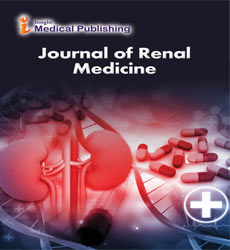Understanding the Diagnosis and Treatment of Renal Cell Carcinoma (RCC)
Fanhua Li*
Department of Nephrology, Shandong University, Jinan, China
- *Corresponding Author:
- Fanhua Li
Department of Nephrology, Shandong University, Jinan,
China,
E-mail: lifanhua@chinna.com
Received date: February 19, 2024, Manuscript No. IPJRM-24-18912; Editor assigned date: February 22, 2024, PreQC No. IPJRM-24-18912 (PQ); Reviewed date: March 07, 2024, QC No. IPJRM-24-18912; Revised date: March 14, 2024, Manuscript No. IPJRM-24-18912 (R); Published date: March 21, 2024, DOI: 10.36648/ipjrm.7.2.13
Citation: Li F (2024) Understanding the Diagnosis and Treatment of Renal Cell Carcinoma (RCC). Jour Ren Med Vol. 7 No.2: 13.
Description
Renal Cell Carcinoma (RCC) stands as the predominant form of kidney cancer among adults, constituting around 90% of all kidney cancer cases. This malignancy arises from the cells lining the small tubules within the kidney and has the potential to metastasize if not diagnosed and managed promptly. Despite its prevalence, advancements in medical research and treatment options have significantly improved outcomes for individuals affected by RCC. Early detection and intervention are pivotal for optimizing outcomes and preserving kidney function. By elucidating the causes, symptoms, diagnostic modalities, and treatment options available for RCC, patients and healthcare providers can collaborate to devise tailored treatment plans aimed at addressing the unique needs of each individual. Continued research and advancements in medical science hold promise for further enhancing our understanding of RCC and improving outcomes for patients affected by this complex disease.
Understanding renal cell carcinoma
The staging system typically comprises four stages: Stage I denotes cancer confined solely to the kidney, Stage II indicates a larger tumor still confined to the kidney, Stage III implies the spread of cancer to adjacent lymph nodes or tissues, and Stage IV signifies metastasis to distant organs such as the lungs, bones, or brain. Accurate staging is crucial for devising an appropriate treatment plan tailored to the individual patient's needs. Smoking ranks as one of the most significant risk factors for RCC, with smokers facing twice the risk compared to non-smokers. Additionally, obesity presents another notable risk factor, as excess body weight, particularly around the abdominal region, elevates the likelihood of RCC development. Furthermore, hypertension has been correlated with an increased risk of kidney cancer. Genetic predispositions also play a role, with conditions like Von Hippel-Lindau disease and hereditary papillary renal cell carcinoma heightening susceptibility to RCC. Moreover, certain occupational exposures to substances such as asbestos, cadmium, and organic solvents have been associated with an augmented risk of developing RCC. RCC may manifest a spectrum of symptoms, although they may not become evident until the disease reaches an advanced stage. Among the most common symptoms are hematuria, characterized by blood in the urine, and persistent lower back or side pain. Patients may also experience the palpable presence of a mass or lump in the abdominal region. Other systemic symptoms may include fatigue, unexplained weight loss, loss of appetite, anemia, swelling of the ankles and legs, elevated blood pressure, and fever. Recognizing these symptoms and seeking prompt medical attention is crucial for early detection and treatment. Diagnosis of RCC typically involves a combination of imaging tests, blood tests, urine analysis, and occasionally, biopsy. Imaging modalities such as CT scans, MRI scans, and ultrasound imaging aid in visualizing tumors within the kidneys, assessing their size, and determining their location. Blood tests may reveal elevated levels of certain substances indicative of RCC, while urine analysis may detect the presence of blood or other abnormalities. In cases where diagnosis remains inconclusive, a biopsy may be performed, wherein a sample of kidney tissue is examined under a microscope to confirm the presence of cancer cells. Staging of RCC helps classify the extent and severity of the disease, thereby guiding treatment decisions.
Treatment of renal cell carcinoma
Surgical intervention represents the primary treatment modality for localized RCC. Nephrectomy, the surgical removal of part or all of the affected kidney, may be performed depending on the tumor size and extent of spread. Partial nephrectomy, involving the removal of the tumor and surrounding healthy tissue, is preferred for smaller tumors, while radical nephrectomy, entailing the removal of the entire kidney, is reserved for more advanced cases. Lymph node dissection may also be performed to remove nearby lymph nodes if cancer has spread to these regions. Targeted therapies such as Tyrosine Kinase Inhibitors (TKIs) and mTOR inhibitors have revolutionized the treatment landscape for advanced RCC. These medications work by targeting specific pathways involved in the growth and proliferation of cancer cells, thereby inhibiting tumor progression. Additionally, immunotherapy, including immune checkpoint inhibitors, harnesses the body's immune system to recognize and destroy cancer cells, offering promising results in the treatment of metastatic RCC. Radiation therapy may be employed as a primary treatment modality for localized RCC or as adjuvant therapy following surgery to eliminate residual cancer cells. External beam radiation therapy delivers highenergy beams precisely targeted at the cancerous tissue to destroy cancer cells. Alternatively, radiofrequency ablation utilizes heat generated by high-frequency electrical currents to ablate tumor tissue, offering a minimally invasive treatment option for select patients. Traditional chemotherapy has demonstrated limited efficacy in the treatment of RCC and is generally reserved for cases where other treatment modalities have proven ineffective. However, ongoing research continues to explore novel chemotherapeutic agents and combination therapies aimed at improving outcomes for patients with advanced RCC. Participation in clinical trials represents a vital avenue for accessing innovative treatment approaches and investigational therapies not yet widely available. Clinical trials offer patients the opportunity to contribute to the advancement of medical knowledge and may provide access to cutting-edge treatments that hold promise for improving outcomes and quality of life.
Open Access Journals
- Aquaculture & Veterinary Science
- Chemistry & Chemical Sciences
- Clinical Sciences
- Engineering
- General Science
- Genetics & Molecular Biology
- Health Care & Nursing
- Immunology & Microbiology
- Materials Science
- Mathematics & Physics
- Medical Sciences
- Neurology & Psychiatry
- Oncology & Cancer Science
- Pharmaceutical Sciences
